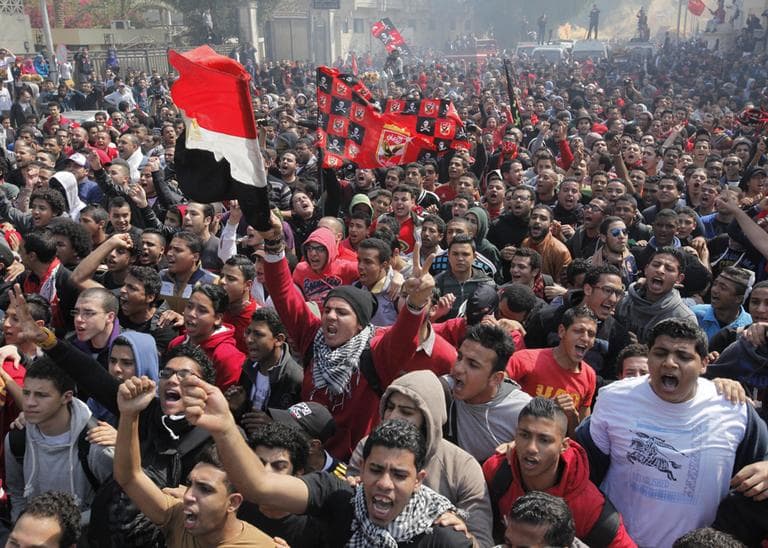Advertisement
Egyptian Protester Dies In Clashes With Police

The trial over the melee that killed 74 people after a soccer game in the city of Port Said in early 2012 has been the source of some of the worst unrest to hit Egypt in recent weeks. While the violence has largely involved fans of rival soccer teams, the case has taken on political undercurrents because many blame the police for standing by during the violence last year.
Shortly after the verdict was announced Saturday, fans of Cairo's Al-Ahly club who had gathered in the thousands outside the team's headquarters in the center of the Egyptian capital went on a rampage, torching a police club nearby and storming Egypt's soccer federation headquarters before setting it ablaze. The twin fires sent plumes of thick black smoke billowing out over the Cairo skyline. Two army helicopters were used to extinguish the fires.
At least five people were injured in the protests, a Health Ministry official told the MENA state news agency.
The court's decision upheld the death sentences issued in late January to 21 people, most Port Said fans. The original verdict touched off violent riots in the Suez Canal city of Port Said that left some 40 people dead, most shot by police.
On Saturday, the court announced its verdict for the other 52 defendants in the case, sentencing 45 of them to prison, including two senior police officers who got 15 years terms each. Twenty-eight people were acquitted, including seven police officials.
The acquittal of the police officers prompted a wave of anger and raised tensions already high over political turmoil, a worsening economy and growing opposition to the rule of Islamist President Mohammed Morsi. The country has faced repeated bouts of chaos in the more than two years since a revolution that ousted autocratic leader Hosni Mubarak.
In unrelated violence, at least two protesters were killed on Saturday in clashes between riot police and stone-throwing demonstrators on a Nile-side street in central Cairo, according to national ambulance service chief Mohammed Sultan. Nineteen others were injured in the clashes near two luxury hotels and the U.S. and British embassies.
In anticipation of more violence, authorities beefed up security near the Interior Ministry, which is in charge of the police force, with riot police deploying in the streets around the complex in central Cairo.
The president of the international soccer governing body FIFA appealed for calm.
"I call on football fans in Egypt to remain peaceful. Violence is never a solution and is contrary to the spirit of sport," Sepp Blatter tweeted.
Earlier at the courthouse across town, Judge Sobhi Abdel-Maguid read out the verdict live on TV, sentencing five defendants to life in prison and nine others to 15 years in jail. Six defendants received 10-year jail terms, two more got five years and a single defendant received a 12-month sentence.
The court's decision on the nine Port Said security officers on trial was among the most highly anticipated - and potentially explosive - verdicts. In the end, the judges sentenced the city's former security chief, Maj. Gen. Essam Samak, and a colonel both to 15 years in prison, while the others were acquitted.
Al-Ahly's fans accuse the police of collusion in the killing of their fellow supporters, arguing that they had advance knowledge of plans by supporters of Port Said's Al-Masry to attack them. They also accuse them of standing by as the Al-Masry fans set upon the visiting Al-Ahly supporters.
The court rulings can be appealed.
Many residents of Port Said, which is located on the Mediterranean at the northern tip of the vital Suez Canal, say the trial is unjust and politicized, and soccer fans in the city have felt that authorities have been biased in favor of Al-Ahly, Egypt's most powerful club.
The Feb. 1, 2012 riot followed a league match between Al-Masry and Cairo's Al-Ahly club, with Port Said supporters setting upon the visiting fans after the final whistle. The deadly melee is Egypt's worst soccer disaster.
In Port Said, a city that for weeks has been in open rebellion against the Islamist president, several hundred people, many of them relatives of the defendants, gathered outside the local government offices to vent their anger. They chanted slogans against Morsi's government and the verdicts.
Some people in a cafe watching the verdict live on TV hit their heads in frustration, while others broke down and wept. Some said they can live with the verdict because an appeal leaves room for hope.
"There's still an appeal process. God willing, our rights will be restored," said Islam Ezzeddin, a local soccer fan. "We are not thugs. I hope to God when there's an appeal, that we feel we live in a country of law and justice."
Several protesters in Port Said sought to disrupt shipping in the vital waterway by releasing small speedboats into the traffic lanes, although the effort failed to disrupt shipping. Others set fire to tires on the city's dock to prevent ships from coming in, but that again was quickly abandoned.
A spokesman for the Suez Canal Authority, Tareq Hasanein, told Egypt's official MENA news agency that shipping in the international waterway was proceeding normally, with 41 vessels transiting the canal on Saturday.
However, the national railways chief, Hussein Zakaria, ordered trains headed to Port Said to terminate their services at Ismailiya, another Suez Canal city south of Port Said. He said the measure was taken out of fear for the safety of passengers.
This program aired on March 9, 2013. The audio for this program is not available.